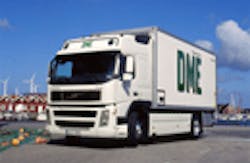DME rebounding as alternative to diesel for trucks and cars
Several big players in the global car and truck market are rekindling an interest in dimethyl ether or “DME” as an alternative fuel, largely because it’s relatively cheap, requires very low injection pressures, and produces little pollution from combustion.
“Although DME’s energy density is lower than diesel, the overall engine thermal efficiency is the same or higher,” explained Jim McCandless, CEO of Alternative Fuel Technologies, which designs and manufactures common rail and injection systems to handle DME in diesel engines.
“DME also costs less than diesel on an equal energy basis; 1.8 gallons of DME will cost less than 1 gallon of diesel, assuming $70/bbl or higher oil price,” he added. “As a liquefied gas like propane, that becomes liquid under low pressure of 60 psi, DME is an ideal diesel fuel [replacement] because it has very high oxygen content – 35% by weight – and no carbon-carbon bonds. What that means is that it cannot produce soot particulates or black smoke.”
McCandless said the fuel’ sootlessness permits the use of very high exhaust gas recirculation (EGR) rates to lower oxides of nitrogen (NOx) emissions without having to use after-treatment devices such as particulate traps and SCR catalysts that require the injection of urea to lower NOx in the exhaust stream.
“Another positive factor is the fuel injection pressures can be much lower than are currently needed by diesel engines. DME engines need injection pressures of about 6,500 psi where diesel engines currently require pressures upward of 30,000 psi. The lower pressure requirements greatly simplify the fuel injection equipment,” he stressed.
Testing of DME as a diesel fuel alternative is currently being conducted by the Volvo Group and Ford Europe, with chemical giant Chemrec AB beginning work on a “BioDME” plant in Sweden that uses a “black liquor gasification technology” to make DME from organic refuse produced by the forestry industry. “Black liquor” is a waste stream of the pulping process, noted Richard LeBlanc, CEO of Chemrec USA, adding that the company’s Piteå, Sweden, plant is expected to be producing DME and methanol by next year.
“[We’re] using residual forestry biomass as our DME feedstock, thus no foodstocks or farmable acreage is used,” he said. “America has been slower than Europe and Asia to catch on to DME as a motor fuel, as DME technology research and development in those areas are mostly government funded. But it is the belief of DME supporters in the U.S. – from government energy researchers, academics and industry – that DME and in particular BioDME has an important role to play in America’s security and energy sustainability.”
Sweden’s AB Volvo, parent of both Volvo Trucks North America and Mack Trucks Inc., has conducted long-term testing with DME since 2005 – testing funded in part by over $12 million in grants from the Swedish Energy Agency. Last year, the company said it began field trials with trucks equipped with third-generation DME-fueled engines and it hopes to have the first production-grade trucks running on DME placed into service by the end of this year.
“The diesel engine is an extremely efficient energy converter that is perfectly suited to many different renewable fuels, liquid or gaseous,” said Jan-Eric Sundgren, a member of Volvo Group management and sr. vp, public & environmental affairs at the time. “With our know-how in engine technology and our large volumes, we can manufacture engines for several different renewable fuels, and also create possibilities for carbon-dioxide-free transports [trucks] in such other product areas as buses, construction equipment and boats.”
Chemrec’s LeBlanc added that DME offers a very high reduction of carbon dioxide emissions – around 95% – compared to conventional diesel fuel. In addition, he said it can be produced with very high conversion efficiency at relatively moderate capital cost and can be made from a variety of renewable materials. And since DME has a high cetane number (the measure of combustion of diesel fuel under compression) with no particle formation during combustion, it provides a very cost effective way to meet stringent exhaust emission targets.
LeBlanc pointed out that in forestry areas, DME plants could be integrated into pulp and paper mills to offer renewable fuel alternatives to both industrial and transportation companies. Chemrec studies show that, for instance, “bio-refineries” located in the upper Midwest could provide DME fuel for municipal fleets, local trucking firms and manufacturers operating in such major cities as Minneapolis, Milwaukee, Chicago and Detroit.
About the Author
Sean Kilcarr
Editor in Chief
Sean Kilcarr is a former longtime FleetOwner senior editor who wrote for the publication from 2000 to 2018. He served as editor-in-chief from 2017 to 2018.
